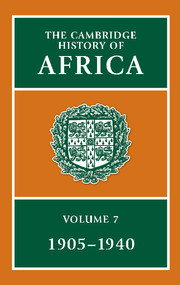Book contents
- Frontmatter
- Introduction
- 1 The imperial mind
- 2 Aspects of economic history
- 3 Christianity
- 4 Islam
- 5 African cross-currents
- 6 The Maghrib
- 7 French black Africa
- 8 British West Africa and Liberia
- 9 Belgian Africa
- 10 Portuguese Africa
- 11 Southern Africa
- 12 British Central Africa
- 13 East Africa
- 14 Ethiopia and the Horn
- 15 Egypt and the Anglo-Egyptian Sudan
- Bibliographical Essays
- Bibliography
- Index
- 10 West Africa from Senegal to Dahomey, 1935
- 13 Belgian Africa, 1939
- References
10 - Portuguese Africa
Published online by Cambridge University Press: 28 March 2008
- Frontmatter
- Introduction
- 1 The imperial mind
- 2 Aspects of economic history
- 3 Christianity
- 4 Islam
- 5 African cross-currents
- 6 The Maghrib
- 7 French black Africa
- 8 British West Africa and Liberia
- 9 Belgian Africa
- 10 Portuguese Africa
- 11 Southern Africa
- 12 British Central Africa
- 13 East Africa
- 14 Ethiopia and the Horn
- 15 Egypt and the Anglo-Egyptian Sudan
- Bibliographical Essays
- Bibliography
- Index
- 10 West Africa from Senegal to Dahomey, 1935
- 13 Belgian Africa, 1939
- References
Summary
THE METROPOLITAN BACKGROUND 1905–1926
At the beginning of the twentieth century Portugal was an underdeveloped country whose economy was perhaps as typical of the Africa she was purporting to civilise as of Europe. This underdevelopment showed all the signs of being a chronic condition. Of a population of six million, 75 per cent still lived in rural communities producing Portugal's main items of export: wine, fruit, olives, fish, timber and cork. Agriculture belonged to a pre-capitalist age and the peasant obtained a pitiful living alike on the minifundia of the north, where he was proprietor, and on the latifundia of the south, where he was sharecropper or labourer. Backward as her rural economy was, Portugal had become the world's principal producer of cork, sardines and fortified wines. There was a marked tendency to overproduce and the government was continually seeking outlets in the colonies; on the other hand, Portugal remained unable to feed herself and did not produce significant grain surpluses until the 1930s.
The urban population worked in cities which were largely pre-industrial. Agricultural produce and sardines underwent some industrial processing, but in 1920 Portugal's only important manufactured export was cotton textiles. Ninety per cent of her foreign trade was carried in foreign ships; imports of manufactured goods were more than twice the value of exports and the visible trade deficit was only covered by remittances from emigrants. Two-thirds of the adult population were illiterate, and rural poverty and overpopulation caused emigration to run as high as 50,000 a year during the first two decades of the century.
- Type
- Chapter
- Information
- The Cambridge History of Africa , pp. 494 - 543Publisher: Cambridge University PressPrint publication year: 1986
References
- 1
- Cited by



